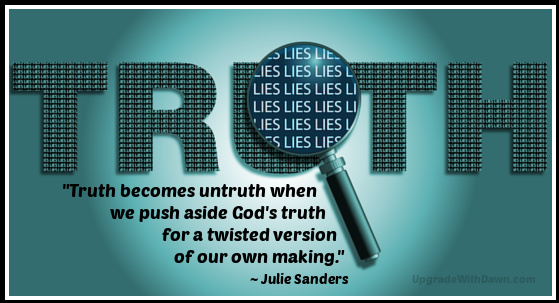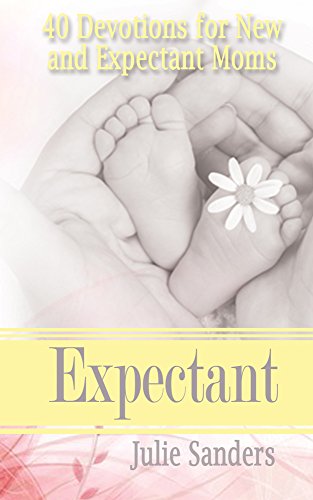How to Know if My Truth Is True
As I've developed a friendship with Julie Sanders, I've come to know her as a woman who handles the Word of God in beautiful, practical ways. In this Biblical Thinking UPGRADE, she reminds us of the importance of discerning truth in our culture, and then explains how Christ-followers are to express the truth.
"We purpose to say what’s true and teach it to our families," Julie says, "but this decade seems determined to disrupt confidence about truth. Instead, conversations center around 'speaking my truth.' How do you know if your truth is true?"
 I (Dawn) am so glad Julie wrote this post. Whether we're considering false prophets or "fake news," it's sometimes difficult to know what is true. As Julie explains, our Father God has given us guidelines for knowing what is true in the culture today—or even if we are believing lies in our own hearts.
I (Dawn) am so glad Julie wrote this post. Whether we're considering false prophets or "fake news," it's sometimes difficult to know what is true. As Julie explains, our Father God has given us guidelines for knowing what is true in the culture today—or even if we are believing lies in our own hearts.
Julie continues . . .
As if underlining uncertainty about so much in 2020, this year has us continuing to wonder about so much. With technology sending out information faster than we can process it, there’s no time to confirm details.
It seems like we’ve entered a time when it’s impossible to know what’s true.
Christians follow Jesus, “who came from the Father, full of grace and truth” (John 1:14). Following Him as Lord means being, “prepared to give an answer to everyone who asks … with gentleness and respect” (1 Peter 3:15).
Followers of Christ value truth and a respectful delivery of it.
Here are five questions to ask to know if what we accept and what we share is actually true.
1. What Does Man Say Is Truth?
Before the new decade arrived, Oprah Winfrey popularized the phrase “speaking my truth” in her 2018 Golden Globe Awards speech.
- It’s become a mantra to validate sharing truth and untruth.
- It’s been pointed for permission to speak opinions, judgments, and emotions under an umbrella of “truth,” accurate or not.
- It’s also liberally used as license to spew truth in whatever way speakers choose, regardless of offense.
We live in a day when people speak whatever they want in whatever way they want.
Does the popular idea of “my truth” mean I get to choose what’s true? Is it possible to know what’s true?
And does making it “my truth” lift limitations on a caustic delivery?
2. What Is God's Measure of Truth?
All of God’s word is true (Psalm 119:160; John 17:17)—a reference point for comparing what is presented to us as real.
A follower of the true God can pray, “Guide me in your truth and teach me” (Psalm 25:5a). His Word illuminates sometimes murky paths of life on earth.
If we keep God’s Word in front of us and lay it over our questions to see it clearly, God's truth will emerge.
Since garden days, when Satan spoke the first lie, untruths have needed exposure.
Now as then, ignoring God’s words opens the door to deception and the destruction that comes with it. His holy Word provides the measure, distinguishing a truth from a lie.
The only one who can rightly claim “My truth” is the Maker of truth.
3. How Does Truth Turn into Untruth?
Truth becomes untruth when we push aside God’s truth for a twisted version of our own making.
Creating and communicating untruth is like rejecting God’s righteous truthfulness out of a preference for what better serves our agenda. By plagiarizing the righteous reality, a peddler of a self-made stories takes a path leading to a disappointing destination.
Untruth never serves God’s holy purposes. Instead, untruth serves our unholy agendas. If it’s still true, it still belongs to God, and it’s still truth.
4. How Can I Be Sure I’m Telling the Truth?
With fake stories and false accounts filling our news feeds, it’s easy to focus on dissecting the stream before us. After all, the Serpent told Eve, “You will certainly not die” (Genesis 3:4)—though he knew her acceptance of this version of “my truth” would lead to her death.
Satan never held to truth telling, “for there is no truth in him … he is a liar and the father of lies” (John 8:44).
While we need to discern truth from lies, our focus is on ensuring we speak the truth. We’re warned not to “let any unwholesome talk come out of” our mouths (Ephesians 4:29), and not to “lie to each other,” because that’s a practice of our old self (Colossians 3:9).
Since God sees everything (Proverbs 15:3)—none of our actions or words are hidden from Him (Jeremiah 16:17).
To be sure you’re telling the truth, ask yourself two questions.
- Did God see what I say I saw?
- Did God hear what I say I heard?
5. What Does God Want Me to Do with My Truth?
If our message aligns with God’s Word, it needs to be communicated God’s way.
Ephesians 4:15 directs us to speak “the truth in love.”
Delivering a wholly truthful message in a wholly loving way means we need to be empowered by a wholly loving Savior.
His forgiveness cleanses us and His Spirit grows us, so loving delivery reflects maturity as we become more like Jesus. Loving Him and His truth means, “we also ought to love one another” (1 John 4:10-12), because “God lives in us and his love is made complete in us.”
Once MY truth transforms into HIS truth, God wants me to speak it in HIS loving way.
The world loves to stamp “legit” on a version of truth. That way, every man can do what’s right in his own eyes, spinning it into tales of triumph (Proverbs 12:15; Judges 17:6). Changing the narrative avoids changing hearts.
When we embrace God’s truth as the only truth, it will set us free (John 8:32).
How am I letting God’s word shed light on messages I receive and shape messages I create? What am I accepting as truth that may not align with God’s truth?
 Julie Sanders loves lifting women who lead globally. She’s the author of The ABCs of Praying for Students and Expectant, a devotional for new moms. Julie
Julie Sanders loves lifting women who lead globally. She’s the author of The ABCs of Praying for Students and Expectant, a devotional for new moms. Julie  finds joy in helping women discover and develop their gifts to influence others. She writes from her online home at juliesanders.org.
finds joy in helping women discover and develop their gifts to influence others. She writes from her online home at juliesanders.org.
Graphic adapted, vector courtesy of Pixabay.
 Post a Comment → Posted on
Post a Comment → Posted on  Tuesday, May 18, 2021 at 10:00AM
Tuesday, May 18, 2021 at 10:00AM  Discerning Truth,
Discerning Truth,  Discernment,
Discernment,  Julie Sanders,
Julie Sanders,  Truth,
Truth,  Truth in Love,
Truth in Love,  Truth-telling,
Truth-telling,  Untruth,
Untruth,  Upgrade with Dawn Upgrade Your Life
Upgrade with Dawn Upgrade Your Life  Biblical Thinking
Biblical Thinking 



